February 25, 2019
Where I Find the Time to Read: The Post-Breastfeeding Edition

In 2015, when my youngest child was not quite two, I published a popular blog post called “Where I Find the Time to Read,” a list of ordinary occurrences disguising excellent opportunities to steal a moment with a book. Understandably, considering my life at the time, many of these occurrences revolved around breastfeeding, which I always found to be a tremendous reading opportunity (and never mind the risk of dropping a hardcover on my baby’s head—and she was fine). But now that it’s been a few years since I’ve breastfed anyone, I wanted to come back to that list, provide some update and revisions. Because of course you don’t need to be lactating to get that book read. The following are how I still manage to be reading all the time.
- A hammock of my own: I may not have a room of my own, but I have a hammock in my backyard set up all summer long in the shade of our silver maple tree. On sunny days, I’ll set up my children with a movie, and then head outside for hammock time, which entails at least an hour of uninterrupted reading, and the reading is ideal there. Everyone should have a hammock, whether metaphorical or otherwise.
- Be prepared: I’ve written about this before, about how I’ve gone to concerts, birthday parties, and even my own book launch with a book in my bag—because you never know when an opportunity for reading is going to arise. Pro-tip: If you’re nearly finished one book, make sure you pack another, and maybe a back-up in case the other doesn’t take. Second pro-tip: book sleeves are really, really great.
- I like my children to be well-rounded: My children are not enrolled in a huge number of extra-curricular activities, but the ones they are involved in permit me to read while they’re attending. I work extra hard at scheduling to make sure both children are busy at the same time so that I can read instead of entertaining the other. I read when they’re at Girl Guides, piano lessons, and swimming lessons, and I find it infinitely rewarding.
- There is no data on my phone: It’s much easier to scroll through feeds on my phone than it is to read, it’s true, but scrolling on my phone makes the time go by so much faster and in the end I have nothing to show for how I spent my half hour while my children were at swimming lessons, just say. But without data, I can only use the internet on my phone where WiFi is available, which (mercifully!) isn’t everywhere yet. It makes my phone less of a distraction and I get a lot of reading done.
- Frequent long baths: For me, a hot bath is like a hammock, an avenue to reading. The only real risk is getting into the bath and realizing that you’re not really into the book you’re reading, so I usually have at least two books piled up on my toilet seat so that there’s no possible reason why I might have to get out of the tub.
- I read for lunch: Going out for lunch with a book continues to be my favourite kind of date, my ultimate indulgence. Restaurant hostesses really do have to get over acting so surprised when a diner shows up for a meal solo though, and you don’t need to make it so awkward by taking away the glass and a cutlery. A good book is worthy of its own plate setting. (Also, when I used to work full-time, I ate my packed lunch with a book every day.)
- Public transit: Okay, I don’t take public transit on a regular basis (my primary mode of transport is walking, which is also a great excuse to read, except it’s winter now and it’s too hard to read while wearing mittens), but whenever I ride the subway, I’m reading a book, whether I’m holding onto a straphanger or sitting in an actual seat. (My biggest regret continues to be that reading on busses and streetcars makes me carsick.)
- I pack books in the bag en famille: While reading in front of people can be anti-social, there is nothing better than reading together. For long subway journeys, trips to the beach, or to the park, I bring books for everybody. The extra weight is worth it for the extra reading.
- I binge-read on my holidays: “How many books is too many books for a weekend away?” so goes the question on social media, captioned to a leaning tower of bookishness. But the question is absolutely rhetorical—there is no such thing as too many books. And I personally consider a holiday a bust unless I’ve managed to read at least a book every day.
- Going to bed early: There is a definite relationship between finding lots of time to read, and being a little bit boring. Once upon a time, when I wasn’t almost forty, I would read into the wee hours of the morning, but those days are gone now, particularly since I must now rise early every morning and go for a swim first in order to have the kind of day I want to have. (My inability to read while swimming continues to be one of my life’s great frustrations.) So now I tend to go to bed soon after my children do, and leave my phone far, far away, which had result in two solid hours of reading before I turn out the light. These days, this is really how I get most of my reading done.
- I stay in bed in the mornings: I do not go swimming on weekend mornings, and instead I roll over and turn the light back on and indulge in a chapter or two. Sometimes if I am lucky, someone will bring me tea. Sometimes my children will also come and visit, but eventually they go away, because watching someone read is very dull.
- My limited relationship with Netflix: The only thing I binge on is books—and tea. I like Netflix a lot, but only watch it on the weekends, and usually just an episode at a time. Which means there is always time to read, even on Fridays and Saturdays.
- I only read good books: What I mean by this is that I give up on books that aren’t working for me. I no longer read books that I think I “should” be reading if I really don’t think they’re appealing. I also have a trusted list of book experts whose recommendations I always listen to, all of which means that when I am reading, the activity is usually a pleasure. Which is absolutely the way it should be.
This post is part of a larger project I’m embarking upon this year which endeavours to make books and reading more accessible to the aspiring avid reader, that person who examines her bookshelves with guilt because she just can’t find the time to get all those titles read, never mind finish that novel for her book club. Stay tuned for more exciting things to come…
February 7, 2019
When Old Books Are New Again

In December, I posted a photo of the book I was reading, Busman’s Honeymoon, by Dorothy L. Sayers (which I purchased at Sleuth of Baker Street), and my friend Leah (a Sayers fan) commented in disbelief that there existed a copy of a Dorothy L Sayers book that was brand new. “I bet the pages don’t even fall out of that one,” Sara added to our conversation, and they really didn’t. And as the only other Sayers novels that I’ve read before have been cheap and battered paperbacks (one that was withdrawn from the North York Public Library), I understood their amazement at my pristine, brand new, spine un-cracked, and with an attractive cover. What does it even mean to read a Dorothy Sayers novel whose pages aren’t held together with an elastic band and which doesn’t smell like mildew? Surely the experience is a little inauthentic?
But it really wasn’t. Great binding and legible text would only add to the experience of a novel that’s pretty enjoyable in its own right. A fresh book will be approached with a spirit of freshness as well, which was only further demonstrated to me when I received a copy of Edith Wharton’s The Age of Innocence for Christmas later that month.

Of course, it wasn’t just any copy of Edith Wharton’s The Age of Innocence. I’d asked for the edition published by Toronto Gladstone Press (owned and operated by celebrated Canadian book designer Ingrid Paulson), a book I’d decided I had to have when I saw the image of the New York City map circa 1879 inside it. I am a sucker for maps in books, plus there were the opera glasses on the cover, and the beautiful, beautiful spine. Is it possible to fall in love with a book for its spine? Reader, I assure you that it is.
On her website, Paulson describes her mission with Gladstone Press as follows: “Old books aren’t always boring. They aren’t necessarily hard to read. They aren’t the ‘bran’ of literature (good for you, but not much flavour). They just end up looking that way. So I am trying to change that.”

I’ve never read The Age of Innocence before. Honestly, take an objective look at the covers of previous editions and ask yourself why I’d even want to. Because I felt like I probably should, mainly. (Winner of the Pulitzer Prize in 1921!) But I’ve got a personal aversion to languid ladies lounging in chairs, and the 1993 movie tie-in edition makes me uncomfortable—what IS that man doing to poor Michelle Pfeiffer’s neck? But those opera glasses: that’s the book I want to read.

And I loved The Age of Innocence, reading it with a pleasure over a single day during the holidays, nothing bran about it. It was an absorbing story of a once-upon-a-time New York that was also timeless, and daring, grappling with problems of women’s liberation that we’ve still not got our head around a century later. Which is to say that there is nothing stale about this novel, and it was a pleasure to discover it in this beautiful edition whose design provides the freshness that such a book deserves.
- Learn more about Gladstone Press, whose other titles are Wuthering Heights and The Hounds of the Baskervilles. And more books are coming this spring.
January 16, 2019
Sparking Joy on the Radio
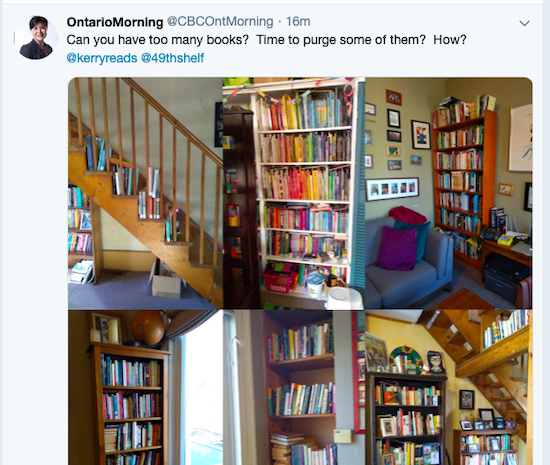
I got to talk about collecting books and keeping books and purging books on CBC Ontario Morning today! I come on at 34.30. Listen here.
December 12, 2018
More on Year End Lists

When I say I posted the above tweet last week in a tongue-in-cheek fashion, I am mostly lying because I was quite serious. In fact, I think I was even more annoyed this year than I was last year when my book did not receive significant acclaim as one of the great literary events of 2017, which is totally stupid, but also underlines that it is never not stupid to be furious that your book has failed to cause an earthquake, that publishing a book turns out not to be a catapult after all. The feelings are legitimate, but these are also feelings that one must necessarily pack away so one can carry on, because what a lucky thing to even publish a book in the first place. Get over yourself, is what I mean.
Although it’s easier to be so magnanimous when your book did not actually, this time, qualify for all those year-end lists it failed to turn up on. Also when you have spent the second year of your novel’s life receiving sweet and not infrequent reminders that the life of a book is long—my book was a Sweet Reads pick in January, I signed copies at a literary festival this fall, on random Saturday nights someone tags their cover in an Instagram post. And finally it’s really easy when you are in fact author of at least three of those year-end lists—the most important ones, in fact. Which possibly provides a little bit of perspective on how arbitrary* the whole process is.
*Which is to not undermine my authority as a literary critic. My year-end lists are amazing.
I have loved so many books this year, and I actually love year-end book lists because it’s one of the few ways that we know how to make books part of a wider conversation. (We need to think of more of these ways. I recently read a statistic that put the percentage of adults who read for pleasure in the single digits, which is shocking. Book clubs are another way, awards lists too, and Canada Reads, and I think those of us who love books have to try harder to make books and reading relevant and find places for them in people’s daily lives.)
So that the real challenge then in coming up with year-end lists for Chatelaine, 49thShelf (which was done in concert with my colleagues), and here at my own blog was not having the lists go on forever. 49thShelf, at least, had the restriction of being Canadian books, and we tried to focus on independent publishers and books we’d featured on the site in order to showcase our content. The Chatelaine list was to be more marketable and broadly-appealing, with each book needing to be markedly notable beyond the fact that I just liked it. Which brings me to the Pickle Me This Books of the Year list, which will be up this week or early next, which is thoroughly my own creation, and which is probably the hardest of the three lists to turn up on, meeting a rigorous standard that I can’t properly articulate, and I don’t even have to.
I guess in some ways, year-end lists are a little bit redundant. The books that didn’t matter to me are the ones I never read in the first place, or else the ones I read in private because I’d decided to keep my opinions to myself. I’ve been keeping a list of My Favourite Books of 2018 (SO FAR)—49thShelf, so Canadian titles only—and while not all these will be on my whittled down final list, they all are certainly contenders and I recommend them heartily. I’ve also been recommending books all year on the radio too, and stand by these picks. Basically I’ve been drowning in a delicious sea of wonderful reading, and these lists are my attempt to find a door to float upon. Also. and it’s distinctly possible, that it all comes down to the fact that I’ve got a list-making compulsion.
November 29, 2018
Gifts
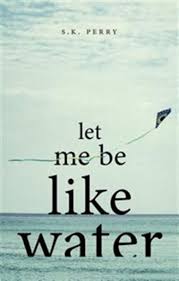 There comes a point when one’s books enthusiasm reaches a certain height at which people just stop giving you books altogether. Because you’ve probably read it already, or if you haven’t, there’s a good reason why not, and either way, you’re probably so overwhelmed with books already that you’re hardly in need of another. And I lament this, the loss of books wrapped up with a bow, because books have always been my favourite gifts to receive. But at the same time, yes, I probably have already read it, or there’s a good reason why I never did. Because part of being a books enthusiast is possessing a very defined sense of what you don’t like too, for better or for worse.
There comes a point when one’s books enthusiasm reaches a certain height at which people just stop giving you books altogether. Because you’ve probably read it already, or if you haven’t, there’s a good reason why not, and either way, you’re probably so overwhelmed with books already that you’re hardly in need of another. And I lament this, the loss of books wrapped up with a bow, because books have always been my favourite gifts to receive. But at the same time, yes, I probably have already read it, or there’s a good reason why I never did. Because part of being a books enthusiast is possessing a very defined sense of what you don’t like too, for better or for worse.
So I relish those rare occasions where it all works out like serendipity, like the time my friend Jennie gave me Catherine O’Flynn’s What Was Lost after I had my first baby. It was one of the best gifts I’ve ever received, an acknowledgement of my identity as a person who was not only a mother, who still deserved something for herself, and could retain an element of who she was before the baby came. Also, because when somebody gives you a book, they give you a world.
At Blue Heron Books in Uxbridge, they’ve had mystery books wrapped in brown paper so that the costumer doesn’t’ know what they’ve got until they’ve bought it. Risky indeed—but then that was how I ended up with Herman Koch’s The Dinner a few years ago, a book I would never have bought on my own terms, but ended up really appreciating.
It was such a good experience that not long ago when I ended up in another bookstore (that shall remain unnamed) I was eager to lay down some cash for another mystery book. And once I bought the book, I was reluctant to even open it, for the mystery to be solved, for the anticipation was actually the best part: what was I going to get? What unknown world was I about to discover? And so imagine my disappointment then when I finally unwrapped my package and the book turns out to be The Fucking Pilot’s Wife by Anita Shreve, an Oprah’s book club pick from 1998, and I think I even read it then, but have no memory of it. A book that every single second-hand bookstore on the planet has at least twenty copies of, willingly or otherwise, and the only way to get anybody to buy them is to wrap them in brown paper. They saw me coming from miles away…
My faith in bookseller picks was restored a couple of weeks ago, however, when I picked up Let Me Be Like Water, by S.K. Perry, purchased in the summer when we visited the wonderful A Novel Spot Books in Etobicoke. It wasn’t wrapped in brown paper, but it might as well have been, because I knew nothing about it, but it was one of their picks of the year and I mostly bought it because they are very good at selling books there—they made it hard to say no. And then a few weeks ago after a reading rut, I finally picked it up, and I loved it. I was reading it on the Saturday morning and for some reason my paper hadn’t been delivered, and I didn’t care, because it meant I could read the novel all morning while I drank my tea and the sun poured into my kitchen. A book it took an expert reader—a bookseller—to connect me with. A kind of magic indeed.
November 6, 2018
The Future of Books is Female
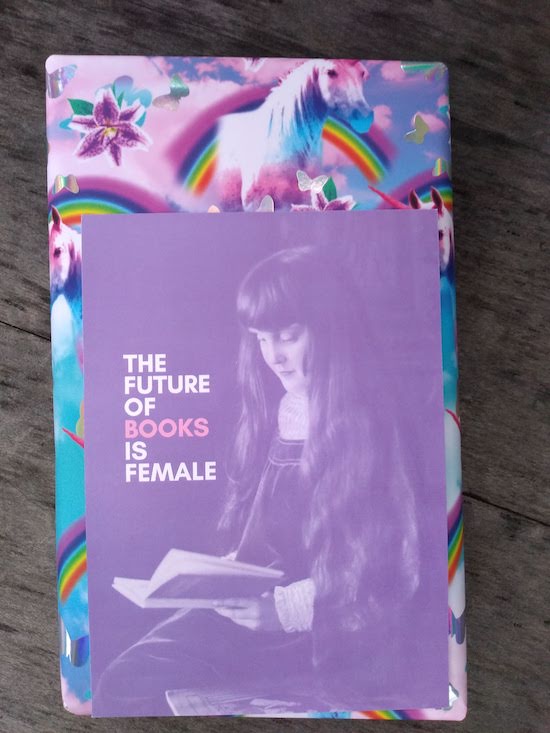
In this moment when so much seems dark, the light tends to shine even brighter, or maybe it’s just that I’m looking for it, but does the distinction even matter? It all began with a tweet thread, I think, when the editor of The Paris Review joined the parade of men who’ve lately been called out for sexual misconduct and when the editorial history of the magazine was being chronicled, one vital detail had gone amiss. “I’m going to show you how a woman is erased from her job,” the writer A.N. Devers tweeted, and proceeded to tell the story of Brigid Hughes, who’d succeeded George Plimpton at The Paris Review after Plimpton’s death, after working at the magazine for her entire career. But out of respect for Plimpton, Hughes was billed as “executive editor,” Plimpton remaining on the masthead. And then a year later Hughes was fired, and thereafter The Paris Review’s second editor and first female editor was written out of its history. Devers would eventually write this story into an essay published at Longreads.
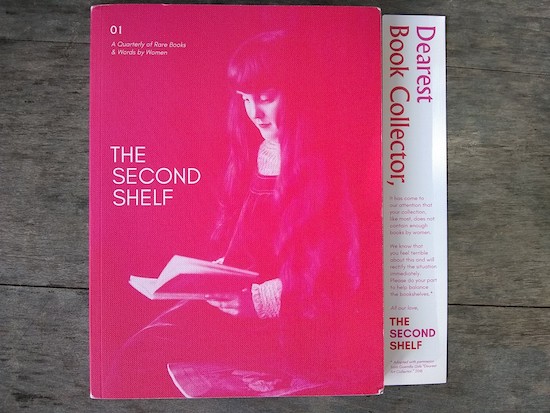
Plans for Devers’ Second Shelf Books venture had been in the works for a few years, apparently (and is just one of the many fascinating things that she’s been up to), but for me the link seemed quite direct to me from her work on re-establishing Hughes’ professional record to starting a business that champions under-appreciated books by women authors (“rare books, modern first editions, and rediscovered works…”), and I was so galvanized by her work on the former that I jumped on board to support the latter. I signed up for the Second Shelf Books kickstarter to support the project and receive a copy of their Quarterly, a gorgeously produced magazine that is a literary catalogue and a celebration of women’s writing at once—and then before time ran out upgraded my support so I would receive a surprise first edition from Second Shelf. And it has been a pleasure to watch from across the ocean as Devers’ vision has become reality, the funding drive a success, a profile in Vanity Fair among other coverage, and the online store expanding to be actual bricks and mortar.
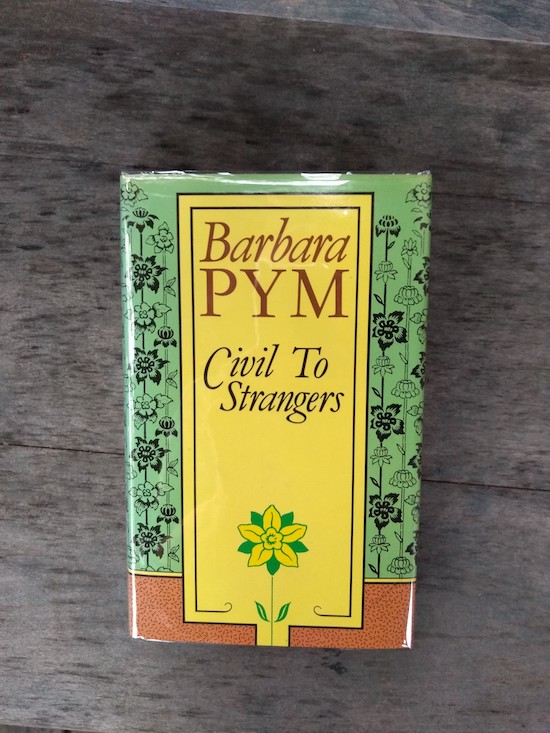
My copy of the Quarterly arrived a month ago, and I’ve deeply appreciated its aesthetic (marbled papers!), what it’s taught me about book collecting, and the writers I’ve been able to discover—for example, the first Black woman in South Africa to publish a novel was Miriam Tlali in 1975, with Muriel at Metropolitan. It has awakened my interest in book collecting for sure, and I’ve been pleased to discover I’ve already got a few first editions by women writers on my shelf, and now I’m on the look out for more—I found Carol Shields’ The Republic of Love at a used bookshop this weekend. It’s an opportunity, as Devers has explained, because books by women have historically been undervalued by book collectors (who’ve tended to be men), and therefore the investment is lower, but as more people begin to take notice, values will begin to rise. Or so it’s hoped, but regardless, I was overjoyed to receive my surprise first edition yesterday, carefully chosen after I’d completed a short survey online of my favourite authors. Wrapped in unicorn paper AND bubble wrap, so my children were squealing, and I got in on it too when I realized which book I had gotten. The hardcover Barbara Pym Civil to Strangers, a collection of stories and fragments published after her death. Could it be more perfect? And who knew there was a whole other reason to buy books that I hadn’t even considered? But I’m hooked now, and excited for the future of Second Shelf Books.
November 1, 2018
Why I Love Literary Prizes/ Why I Don’t Care About Literary Prizes
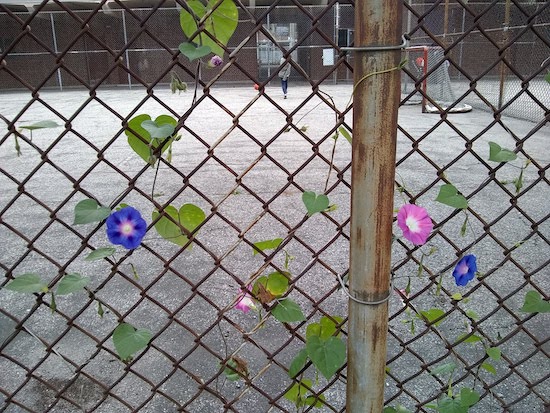
I couldn’t decide whether to call this post, “Why I Love Literary Prizes,” or, “Why I Don’t Care About Literary Prizes,” which one would garner the most outrage and clicks, and it says something about literary prizes that both perspectives are controversial. And they’re both true, in my case. I don’t care about literary prizes, which is why I love them. Although I’m not saying that if you gave me a literary prize I wouldn’t love them even more, of course—MY LITERARY PRIZE DOOR IS ALWAYS OPEN…especially because I broke my phone and now it no longer types As or exclamation marks, and if you gave me a literary prize with cash value (or a gift certificate to Wind Mobile) I would be able to afford to buy a new one.
But in the meantime, I will tell you that I used to care deeply about literary prizes once, because as a reader they were my gateway into feeling like part of a wider literary community. I read that book that won the Giller Prize by the doctor who met Margaret Atwood on a cruise ship—Vincent Lam! Although I can’t remember what the title was. I also recall being ecstatic when Elizabeth Hay’s Late Nights on Air won the Giller Prize, because I really loved that book when I first read it. It felt good to be part of a thing that everyone else was doing, and to receive reading recommendations, because this was about ten years ago, which is when my bed wasn’t a mattress on top of a perilously toppling pile of books stacked onto infinity.
But then I started to become more defined as a reader, and have a deeper knowledge of “the CanLit scene” and started paying attention to things like small presses vs. big presses, which meant that literary prize culture started to seem annoying—because these books were supposed to be celebrating “the best,” but I wasn’t sure they were doing the greatest job of that. This was also before I discovered that “the best” is not a thing, and that tastes (and juries) are subjective. But before that discovery, prizes seemed frustrating and useless and occupied so much real-estate literary-coverage wise that I’d rather ignore them than pay attention, because I don’t get off on being angry for recreational purposes. If a book I liked won the Giller Prize (Hello, Hellgoing!), well then, hurray. But I was certainly not going to read a book just because it had a sticker on it, and definitely not if it was a book that I had no intention of reading in the the first place.
Another reason I went off literary prizes was because I’d have to listen to writers moan about not winning them, and also hear others declare that winning such prizes was “humbling” (which makes no sense whatsoever). The collective malaise that hits Canadian authorial communities on the days when shortlists are announced is even more annoying than a poet who reads for thirty-five minutes—it makes me want to all-caps scream, GET OVER YOURSELVES. Yes, you worked hard on your book, and yes, you would have wanted this success for your publisher who put all his faith in you and your book, and who wouldn’t want to win hundreds of thousands of dollars (or a Wind Mobile gift certificate, even). But I have wanted a great deal many things in my life that I never got, and so have you, and one upside to the downsides of being a woman is that we rarely ever feel entitled to anything, including the things we’ve earned, so your assumption that you belonged on a prize list is kind of weird to me and I just think you should stop it, and go out for a beer and cry with your best friend, and them move on with things. It’s going to be fine.
I am also an author of commercial fiction, which never gets nominated for literary prizes anyway, which makes the whole equation easier for me. Although I will admit that I was fully prepared to be UNEXPECTEDLY nominated for the Giller Prize last year for my SUBTLY BRILLIANT UNDERRATED BOOK, and I’d been practicing both feigning surprise AND being a dark horse, and when the call never came, all that practice was for nothing, but I am an author, so certainly that wasn’t my first disappointment. All of us in this area are nothing if not well-trained.
When I am not busy being a non-award-winning author with a broken phone (VERY GLAMOROUS), I am fortunate to earn a living as editor of the Canadian books website, 49thShelf, and it was through this role that my appreciation for literary prizes began to return—for practical reasons, mostly. Because it’s part of my job to switch up featured books and lists on our homepage every week, and it’s a task that’s very easy this time of year as prize lists and award winners are being announced by the day—just this week, The Taste Canada Prizes, the Governor General’s Literary Awards, the Canadian Children’s Book Centre Awards. List after list, some with the usual suspects, but others with titles readers might not have heard of yet. And while not all prize lists lead to a huge bump in sales, I still love the way these lists shine a spotlight on titles and place them in a broader literary context. I love anything that gives us a reason to talk about a book—to make a book news, to tell a bookish story, to get us a little more excited about books. The actual awards might not be hugely meaningful (apart from a few with big cash prizes and sales bumps), but the books themselves mean an awful lot, and anything that gives even a few readers the chance to discover that is perfectly fine with me.
August 28, 2018
On Diversity and Excellence

Earlier this year, some windbag on Twitter had a hissy fit and started posting about how—and I quote—”Political correctness is killing fiction,” which I found really annoying mostly because of a conspicuous lack of evidence that this windbag has read a single work of fiction in the past five years. And also because what he really meant by “political correctness” was actually a) that white writers are facing a new and demanding kind of criticism in their work when they write about other cultures and b) a new spotlight on and celebration of works by writers who are telling stories many of us haven’t heard before. These comments were also really frustrating because this person who never reads fiction was proclaiming the death of fiction when my own personal experience is that fiction has never been so rich. I was reading The Lost Girls of Camp Forevermore, by Kim Fu, when this stupid tweet was posted, which only underlined its absurdity. I loved that book. And all this came to mind again last week when I had the great fortune of reading Claudia Dey’s Heartbreaker followed by Miriam Toews’ Women Talking. Has fiction ever been more alive? But I guess you actually have to read a book to know that.
Not unrelated, the other day Conservative MP Lisa Raitt was quoted as saying, somewhat incoherently, that she wouldn’t want a place in the Liberal Party as a woman because if she succeeded there she’d never really know if she’d made it on her own merits or if it was because a certain number of women had been mandated. As though the two categories (quotas and qualified candidates) were mutually exclusive, as though there might not be a healthy pool of qualified women candidates to choose from—which, admittedly, for the Conservatives, is a possibility, as their candidates in the 2015 federal election were 20% women, vs. 42% for the NDP. The Liberal candidates were only 31% women, which was not entirely impressive, and yet. When Prime Minister Justin Trudeau unveiled his gender balanced cabinet (because it was 2015, if you recall) he somehow still managed to appoint a Health Minister who was a doctor, an Attorney General who was an Indigenous lawyer, an International Trade Minister who’d been a Rhodes Scholar and a renowned expert on global finance, an Environment Minister with a master’s degree in International Relations from the London School of Economics, a Minister of Sport and Persons With Disabilities who has been a lawyer and a Paralympic athlete, and a Minister of Science who has been a scientist since receiving her PhD in 1992. And while we’ve all spent a lot of time in the years since then thinking about the fact of gender parity, too little focus has been put on the fact that these women are among the most qualified cabinet members I’ve ever seen in my lifetime.
Lisa Raitt too comes to the political arena with a lot of expertise and experience—and something to keep in mind when thinking about gender parity is how much more excellent a woman has to be than her male peers in order to reach the same levels of success. Which reminds me of this very funny satirical piece written shortly after Trudeau’s cabinet was appointed: “50% female cabinet appointments lead to 5000% increase in guys who suddenly care about merit in cabinet:” “I mean, Jason Kenney alone was Minister of Immigration before being shuffled to Multiculturalism, then Social Development, and then finally National Defense—clearly because he was the most qualified person in the entire country on all those four completely unrelated files.” Clearly.
They are not exclusive, diversity (whether it be gender balance and ideally beyond) and excellence, is what I mean. Is what Trudeau’s cabinet has proven, although so many seem to miss the point, forest for trees etc. because for ideological reasons a focus on diversity makes many peoples’ heads explode. But I will go so far as to say that excellence is actually a natural product of diversity, which is why diversity is so necessary and important right now as our society confronts a variety of challenges. And if you’re looking for excellence, diversity is naturally what happens. And if diversity doesn’t happen, then you have failed in making something excellent.
 Which was only confirmed for me in my experience as a juror for The Journey Prize this year—as jurors, we read one hundred stories with no identifying details of their authors. Which is a fraught exercise at this political moment, particularly if you are someone who, like me, thinks that the author is not dead and personal identities matter. Fraught, because I didn’t want to fail at excellence. Of course, the stories themselves are what really matters, but personal identities matter too because it’s always obvious to me when I’m reading a book about a fourteen-year-old girl written by a man who has no idea what that feels like and who has failed in the imaginative leap of writing that experience in a way that is convincing. Personal identities and experience only fuel a writer’s work, I think, and make that work so much richer. So much more excellent. But all this was still just faith for me while I was reading stories for the Journey Prize, and my fellow jurors and I were having some meaningful conversations about what excellence meant. Concluding, basically, that we wanted the stories we selected to definitively not be the Jason Kenneys of literature, in a nutshell. Serving as Minister of Immigration before being shuffled to Multiculturalism, then Social Development, and then finally National Defense. We wanted specificity. Details, in addition to sparkling prose. We wanted to be unsettled in ways that are entirely new, transported to places that were familiar and yet unknown to us. No mediocrity would sneak its way into this book. We wanted unfailingly interesting.
Which was only confirmed for me in my experience as a juror for The Journey Prize this year—as jurors, we read one hundred stories with no identifying details of their authors. Which is a fraught exercise at this political moment, particularly if you are someone who, like me, thinks that the author is not dead and personal identities matter. Fraught, because I didn’t want to fail at excellence. Of course, the stories themselves are what really matters, but personal identities matter too because it’s always obvious to me when I’m reading a book about a fourteen-year-old girl written by a man who has no idea what that feels like and who has failed in the imaginative leap of writing that experience in a way that is convincing. Personal identities and experience only fuel a writer’s work, I think, and make that work so much richer. So much more excellent. But all this was still just faith for me while I was reading stories for the Journey Prize, and my fellow jurors and I were having some meaningful conversations about what excellence meant. Concluding, basically, that we wanted the stories we selected to definitively not be the Jason Kenneys of literature, in a nutshell. Serving as Minister of Immigration before being shuffled to Multiculturalism, then Social Development, and then finally National Defense. We wanted specificity. Details, in addition to sparkling prose. We wanted to be unsettled in ways that are entirely new, transported to places that were familiar and yet unknown to us. No mediocrity would sneak its way into this book. We wanted unfailingly interesting.
And guess what: diversity happened. My faith confirmed that diversity and excellence are inextricably linked. When we focussed that hard on excellence, we ended up with a list of writers from a range of ages and backgrounds. Some of them names we’d never heard of before, others that were familiar. A list of writers whose faces look more like the world does than your average Conservative cabinet, which is a wonderful thing to discover, that something has gone very right in the process. Because diversity and and excellence go hand and hand, as the Journey Prize Stories 30 will demonstrate when it comes out next month. In addition to serving as a reminder that fiction is absolutely thriving.
August 3, 2018
Five Stars
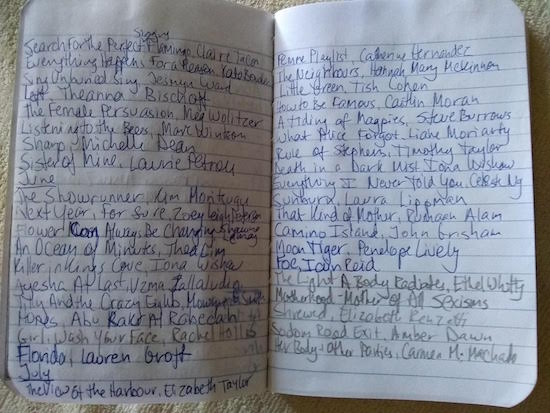
I finished reading a novel last night, and thought what a wonderful thing it was to have no need at all to consider out of five how many stars this book deserved. What a relief it was just to read, and not to rate, or even go online at all (and it is certainly also a bonus also not to stumble across reviews of my own book that begin with, “Wow, this was a painful read. How boring was this, am I right?” (Not that I’ve ever sought out Goodreads reviews of my book. I am far too cool and assured for that, as you no doubt realize.) Instead, I just open up my Book of Books which lives on my bedside, inspired by Vicki Ziegler and Pamela Paul. And another book is entered, with whatever writing device I happen to have on hand. (I really need to go shopping for pens.) Last month, I read twenty books, which I think might be an all-time record for me. It’s been a glorious summer for reading so far, and there is still so much of August left, and I’ve been able to even reread, and make a little dint in the pile of books on the stairs, though you might not know that to see it. You see my Book of Books though, and you’ll realize I’ve been going places, bookwise. Halfway through the first year tracking books with this method, I just want to check in and say it’s wonderful, analogue, good for the soul. Five stars all the way.
October 10, 2017
Where do my books come from?
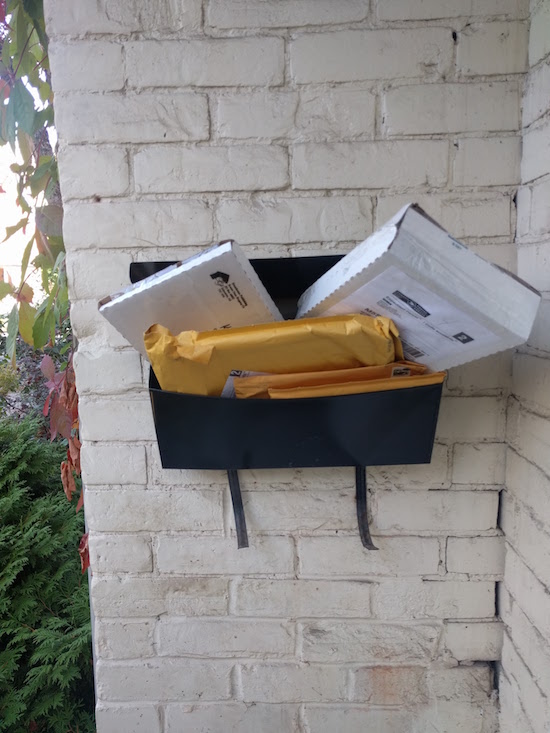
The other week I posted a photo of my mailbox on a day that was, I’ll admit it, particularly remarkable, but not unprecedented. I get a lot of books in the mail, and the photo received a lot of likes and comments that made me think about a variety of things—where my books come from, what I do with the books I receive from publishers, whether or not I persist with books I’m not enjoying, and other things. These questions are going to be the foundations of this post, and a couple of others to come, but I wanted to start with this, which is a meme I’ve done before involving listing the last books you’ve read most recently and where they came from.
- Saints and Misfits, by S.K. Ali: Received from publisher
- My Conversations with Canadians, by Lee Maracle: Purchased from Publisher’s Booth at Word on the Street
- Dazzle Patterns, by Alison Watt: Received from publisher
- What Happened, by Hillary Rodham Clinton: Purchased from Publisher’s Booth at Word on the Street
- Snacks: A Canadian Food History, by Janis Thiessen: Received from publisher
- Collected Tarts and Other Indelicacies, by Tabatha Southey: Received from publisher
- Once More With Feeling, by Meira Cook: Received from publisher
- Just Jen: Thriving Through Multiple Sclerosis, by Jen Powley: Purchased from Staff Picks shelf at Audreys Books
- If Clara, by Martha Bailey: Received from publisher
- The Mother, by Yvette Edwards: Purchased from A Different Book List
- We All Love the Beautiful Girls, by Joanne Proulx: Purchased from Hunter Street Books
- What is Going to Happen, by Karen Hoffman: Received from publisher
- A Bird on Every Tree, by Carol Bruneau: Received from publisher
- Guidebook to Relative Strangers, by Camille Dungy: Purchased from Parentbooks
- The Misfortune of Marion Palm, by Emily Culliton: Purchased from Happenstance Books and Yarns
- Glass Houses, by Louise Penny: Received from publisher (ARC)
- Today Will Be Different, by Maria Semple: Purchased from Parentbooks last year, this was a reread
- Annie Muktuk and Other Stories, by Norma Dunning: Received from publisher
- The Lesser Bohemians, by Eimear McBride: Purchased from Blue Heron Books
- Pond, by Claire Louise Bennett: Purchased from Parentbooks, this was a reread
- The Murder Stone, by Louise Penny: Found it in cottage library
- Wilde Lake, by Laura Lippman: Purchased from Happenstance Books and Yarn
- Truly, Madly, Guilty, by Lianne Moriarty: Purchased (secondhand) from Beggar’s Bouquet Books
- Scarborough, by Catherine Hernandez: Purchased from Mabel’s Fables
- History of Wolves, by Emily Fridlund: Purchased from Lighthouse Books
- Weaving Water, by Annamarie Beckel: Borrowed from the Toronto Public Library
- Do Not Become Alarmed, by Maile Meloy: Purchased from Curiosity House Books
- Turning, by Jessica J. Lee: Purchased from Curiosity House Books
- The Burning Girl, by Claire Messud: Received from Publisher
- In the Land of the Birdfishes, by Rebecca Silver Slayter: Purchased from Lexicon Books
Results are a little bit skewed because eight of these are books I read on my summer vacation and I tend to more deliberate in those choices, but still. Of the 30 books I read, 11 of them were received from publishers. They tended to be smaller publishers too because a) these are publishers I have relationships with through my work with 49thShelf.com and b) some of these books are harder to find in Ontario bookstores so I am unlikely to come across them on my own steam, at least before review copies arrive. A few are books that I would not have previously sought out of my own. Two of them I read because their publicists were quite emphatic that I, Kerry Clare addressed personally, should do so—nice work publicists; you were right. And when I do read these books publishers send me, I tend to write about them either on my blog or on 49thShelf.com, or in both places.
I tend not to read ARCs because I don’t like them—I liked to read finished books with nice covers and I like to read them when everyone else is reading them.
I also buy a lot of books and am an avid independent bookshop customer.
And finally, I don’t disclose in blog posts if I’ve received a book from a publisher. A lot of bloggers do, and on some blogs that are exclusively review sites, it makes sense. But I don’t think it does for me. I trust myself after ten years that my reviews are not biased because I’ve received a review copy—though this was a learning curve for me for sure but I got over it years ago. I get so many books in the mail, most of which I don’t even read, that the idea of treating these books differently than the books I purchase myself is kind of ridiculous—if anything, these books that find their way to me rather than me seeking them out myself actually get read much more critically, as in, “You better be worth my precious time, Book-I-didn’t-even-ask-for.” I also know that professional reviewers (of which I am one) receive review copies as standard practice and this doesn’t need to be disclosed in their reviews. And finally, I see this blog as a space for me, first and foremost, and that anybody else likes to read it is just gravy, but to pepper my posts with disclosures and the like would undermine the authenticity of what I’m up to here.





